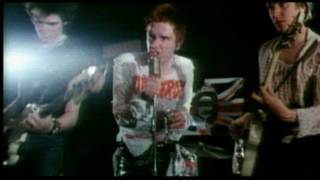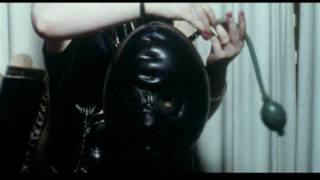The Filth and The Fury: Filth, Thou Liest!
 This has been described as Julien Temple's apology for The Great Rock and Roll Swindle. Rather than following a script dictated by Malcolm McClaren, he gets the Pistols themselves to talk about what the band really meant to them. He intersperses the film with fast cuts to stock footage, old TV commercials, Pistols in concert. Most of the Pistols are interviewed with their faces in the dark, so as to draw any attention away from how they might look at the time of the interview. All of the discussions with McLaren are done in his rubber suit, apparently original footage from Swindle.
This has been described as Julien Temple's apology for The Great Rock and Roll Swindle. Rather than following a script dictated by Malcolm McClaren, he gets the Pistols themselves to talk about what the band really meant to them. He intersperses the film with fast cuts to stock footage, old TV commercials, Pistols in concert. Most of the Pistols are interviewed with their faces in the dark, so as to draw any attention away from how they might look at the time of the interview. All of the discussions with McLaren are done in his rubber suit, apparently original footage from Swindle.  McLaren says that he had hoped to promote the Sex Pistols as the next Bay City Rollers. John Rotten (aka John Lyndon) can't even bring himself to say McLaren's name and just refers to him as "the manager" or "management" - he laughs in disgust at the notion that they were the Bay City Rollers (to which Temple cuts to some footage of the Rollers emphasizing the point.). McLaren is also accused variously of bilking the band of money, misrepresenting them in the press and all sorts of other petty crimes. Still, it was his vision that put the whole concept together even if it became bigger than himself.
McLaren says that he had hoped to promote the Sex Pistols as the next Bay City Rollers. John Rotten (aka John Lyndon) can't even bring himself to say McLaren's name and just refers to him as "the manager" or "management" - he laughs in disgust at the notion that they were the Bay City Rollers (to which Temple cuts to some footage of the Rollers emphasizing the point.). McLaren is also accused variously of bilking the band of money, misrepresenting them in the press and all sorts of other petty crimes. Still, it was his vision that put the whole concept together even if it became bigger than himself.
Tensions within the band -- the Cook/Matlock/Jones camp vs. the Lyndon/Vicious, the former being competent but somewhat clueless as to what was going on aroudn them and Lyndon pushing them to expand and do something new. Lyndon also is shown crying over Sid Vicious's death, regretting that he hadn't done anything to get him off heroin. There's also a significant amount of interview time with Vicious himself, who comes off as a rather pathetic wretch filled with self-pity and fully aware that his heroin habit would eventually take him. Nancy Spungen is also portrayed as a villian and blamed for hooking him on the drug.

The entire short history of the band is recounted through enthralling concerts, their now somewhat quaint profanity-laced druken appearance on the BBC's equivalent of the Today show, their romp through three record companies, their ill-fated American tour and finally their dissipation as Lyndon finally got fed up with "the management". The Sex Pistols and Lyndon in particular are also placed into the context of British cultural history, compared with Lawrence Oliver's performance as Richard III and the broad slapstick post-war British comedy, all of which Lyndon surprisingly agrees with. This is quite an original documentary and much better than Temple's first film on this subject or his (previously reviewed) short piece on the UK Subs (some of the latter footage also appears here).

1 Comments:
Agreed, it's an excellent documentary. I have it on VHS but must search out the DVD. A few months ago I noticed that Rude Boy, a sort of semi-documentary about The Clash from around 1981, is out on DVD. The film itself is poor but the Clash live footage is worth it - you can simply scan over the irrelevant bits.
I always thought the reason Temple interviewed the older Pistols with their faces in the shade was just to parody the convention of many British documentaries - in the days before you could digitally just scrub out a face, when someone was a convicted criminal, or wished to remain anonymous for whatever reason, they'd usually resort to that sort of hokey lighting effect. Mind you, it does have the kind of distancing effect you mentioned - "that was then, and you can't see them now".
Post a Comment
<< Home